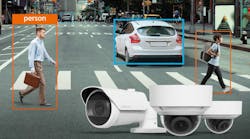Established in Ireland in 2003, Netwatch is one of the leading providers of managed video services in Europe with operations extending into South Africa, the Middle East and the U.S.
In addition to providing customers with surveillance equipment for no upfront costs, the company also offers live video monitoring of client sites from their communication hubs. The company’s operators, referred to as “Intervention Specialists,” proactively monitor clients’ properties, visually verifying when a breach has occurred and can use live audio warnings to ward off intruders or notify the authorities when necessary.
The firm even has its own R&D arm, Netwatch Visual Labs, where it has developed several of its own proprietary software platforms. These include VERITAS, which identifies intruders within a facility and CRATOS, which receives and filters alarms at their communication hubs. Its new CORE software enables a facility manager to communicate with the Netwatch Monitoring software, providing them with features such as intelligent zoning, entry and exit zoning, and visitor passes.
Netwatch’s customer base is predominantly comprised of commercial clients, such as critical infrastructure sites in power generation and transmission networks and utilities, as well as general commercial facilities in logistics, warehousing and manufacturing.
Earlier this month, the company opened a new operations center in Chicago looking to gain a bigger foothold in the U.S. market. SecurityInfoWatch.com (SIW) recently caught up with Netwatch CTO Niall Kelly to discuss their expansion plans for the U.S. and what sets them apart from the competition.
SIW: Who would say are your biggest competitors and what differentiates you from them?
Kelly: Generally speaking, our competition is the “big guns” in the manned guarding space. We offer a more cost-effective option to manned guarding for a facility, especially where the client has indicated that they need to reduce their security budget from an operational excellence point of view.
Being relatively smaller means we can be agile, developing specific tailored solutions for clients with security issues. An example of this would be a national quarrying client where we developed license plate recognition software that reports anomalies in quarry traffic through the Netwatch portal, raising alerts in the event of hot-listed vehicles entering remote sites, and generating daily reports that integrate into the client’s ERP software system. That type of bespoke service is not typically developed by the larger companies.
Another differentiator is our business model; we solely offer a managed service offering, where we don’t charge for equipment on a capital basis but rather charge an all-inclusive daily fee with permanent warranty. This allows a client to budget their security costs with no worries about product replacement or obsolescence issues.
SIW: What’s your footprint globally and where are you hoping to expand in the U.S.?
Kelly: With clients across four continents, our main offices are located in Ireland, the UK and at several locations in U.S, namely Boston, New York, Pittsburgh and most recently, Chicago. We will have a West Coast presence in California within a few months and are in the advanced stages of opening a Texas office in Houston. We are also in talks in relation to a partnership with a telecoms company which would bring us to the Caribbean market.
SIW: How has your solution been received among American clients since it was first launched in the market in 2012? How many U.S. clients do you have currently?
Kelly: Currently we serve over 500 clients in the U.S., particularly in the utilities, manufacturing and warehousing space. Our offering has been well received, with clients regularly commenting that they had not been aware of proactive video protection services such as ours before. Many clients would have had good camera surveillance systems; however, those systems were designed for passively recording and post-incident review. Our service creates a whole new level of proactive monitoring.
The managed service business model has also been well received. Many clients have previously invested large amounts of capital in surveillance systems that are either closed loop or obsolete after a relatively short time. With our service-level agreements on equipment upgrade and software development included in our managed service fee, the client’s system is never out-of-date.
SIW: What kinds of capabilities will the new Chicago Operations Center provide you with and how will it help you grow in the U.S.
Kelly: Our new Chicago base will provide us with both install and service fulfilment, and sales capability for this vital region. We chose Chicago as our north-western location as it is one of the fastest growing regions in the U.S. for its transportation and logistics hub, built around O’Hare International Airport. We predict major demand for our new product offerings coming from Netwatch Visual Labs, which are based around mobile video protection of high value goods and video-based fire detection systems for warehouses.
SIW: What’s your go-to-market strategy in the U.S.?
Kelly: Initially, when we launched in U.S., we had to build credibility for the Netwatch system with new clients and essentially educate the marketplace as they had not seen the technology. We needed to prove our concept, so we dealt directly with early clients in the utility, auto, retail and warehousing space. Since then, we have been building a dealer network across the country and we are currently working with some large-scale integrators who are bringing the solution to their clients. We are constantly on the lookout for quality companies to partner with; ones that share the same core values and whose growth strategies are aligned to our own.
SIW: What kinds of organizations make up your customer base both in the U.S. and globally?
Kelly: We do tend to follow clients and serve their needs across the nation, especially those with multi-site requirements. An example of this would be a large construction equipment rental client who has operations across 12 states. We are quite clear in terms of our target markets and client size - our offering is generally not for small retail, for example. Our ideal client has the type of facility where our Intervention Specialists can make a clear decision as to the nature of a security breach, i.e. should a person be on the facility or not. Our service is absolutely ideal for a closed, remote utility site but perhaps not for a 24-hour hospital, for example.
SIW: What are your plans for growth in both the short- and long-term?
Kelly: We aim to expand our footprint across the U.S. and get closer to key clients with more offerings aimed at business continuity issues and video as the common denominator. An example of this is our hotspot monitoring for our waste facility clients where we can offer add-on services on top of our video security offering.
NERC and FERC regulations are driving heavy security requirements for our utility clients and we are seeing high demand for electronic security measures as opposed to manned guarding adoption in that vertical. We are also a large provider nationally in electronic security systems for the legalised Canna-business in both the growing and dispensing industry. Additionally, our mobile video vehicle protection system is being well received as state standards drive security for the transport of produce for these clients.
SIW: What do you see as being some of the biggest trends impacting the market currently and what kind of effect have they had on your company?
Kelly: Technology costs have come down drastically over the last few years, which make the solution, and particularly the hardware, more affordable for clients. Cloud computing has enabled us to process video from thousands of worldwide locations with no limitations in terms of processing or server limitations, which allow us to answer and process alerts more rapidly than ever before. The increase in Cellular telecommunications coverage and bandwidth has enabled us to offer services to clients where we could not have previously.
The flip side of all these technology enabled solutions is the increased need for really effective cybersecurity systems which protect clients against increasing threats. We have invested heavily in state-of-the-art systems which ensure that we, as a company, cannot be compromised, nor can our networks or client systems.
The upcoming European GDPR (General Data Protection Regulations) will ensure that corporations must treat clients’ personal data (including CCTV data) with incredibly robust procedures around access and content. We believe that this level of sensitivity will also become the norm in the U.S. and we will be well placed to help organizations meet the demands of any new regulations that appear.
About the Author:
Joel Griffin is the Editor-in-Chief of SecurityInfoWatch.com and a veteran security journalist. You can reach him at [email protected].


